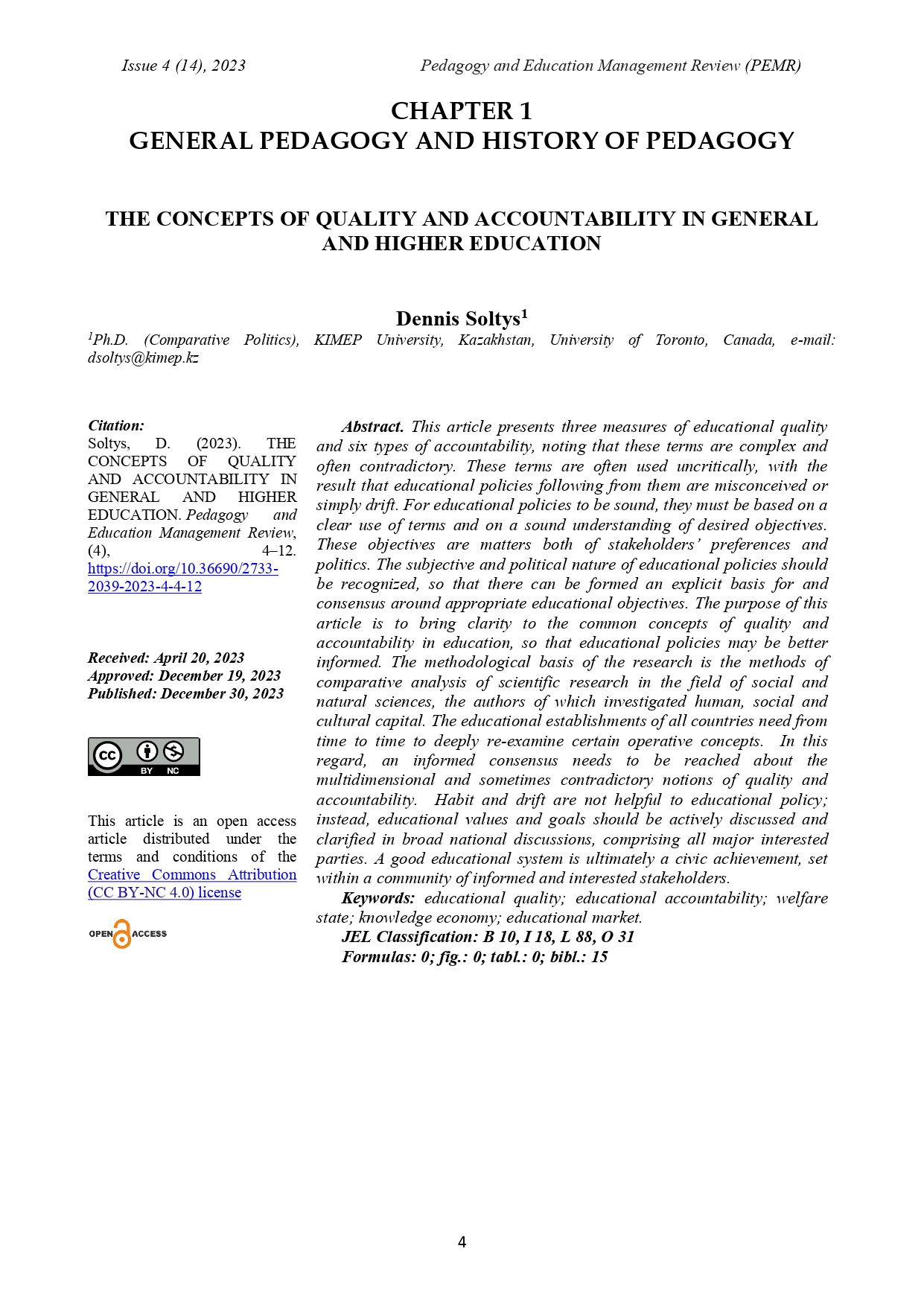THE CONCEPTS OF QUALITY AND ACCOUNTABILITY IN GENERAL AND HIGHER EDUCATION
DOI:
https://doi.org/10.36690/2733-2039-2023-4-4-12Keywords:
educational quality, educational accountability, welfare state, knowledge economy, educational marketAbstract
This article presents three measures of educational quality and six types of accountability, noting that these terms are complex and often contradictory. These terms are often used uncritically, with the result that educational policies following from them are misconceived or simply drift. For educational policies to be sound, they must be based on a clear use of terms and on a sound understanding of desired objectives. These objectives are matters both of stakeholders’ preferences and politics. The subjective and political nature of educational policies should be recognized, so that there can be formed an explicit basis for and consensus around appropriate educational objectives. The purpose of this article is to bring clarity to the common concepts of quality and accountability in education, so that educational policies may be better informed. The methodological basis of the research is the methods of comparative analysis of scientific research in the field of social and natural sciences, the authors of which investigated human, social and cultural capital. The educational establishments of all countries need from time to time to deeply re-examine certain operative concepts. In this regard, an informed consensus needs to be reached about the multidimensional and sometimes contradictory notions of quality and accountability. Habit and drift are not helpful to educational policy; instead, educational values and goals should be actively discussed and clarified in broad national discussions, comprising all major interested parties. A good educational system is ultimately a civic achievement, set within a community of informed and interested stakeholders.
Downloads
References
Peters, M., 2010. “Three Forms of the Knowledge Economy: Learning, Creativity and Openness.” British Journal of Educational Studies, Vol. 58, No. 3, 67-88.
Taylor, J., 2018. “The State and Higher Education Institutions: new pressures, new relationships and new tensions,” 9-35, in Roger Goodman, Sachiko Kariya, and John Taylor, Eds., 2018. Higher Education and the State – changing relationships in Europe and East Asia. Oxford. Symposium Books.
Cohn, E. and Geske, T., 1990. The Economics of Education, 3rd edition. Oxford. Pergamon Press.
Barrett, L., 1996. “On students as customers – some warnings from America.” Higher Education Review, No. 3, 70-73.
Gidney, R., 2002. From Hope to Harris – The Reshaping of Ontario’s Schools, Toronto University of Toronto Press.
Gray, J., 1990. “The Quality of Schooling: Frameworks for Judgement.” British Journal of Educational Studies, No. 3, 204-223.
Epstein, D., 1993. “Defining Accountability in Education.” British Educational Research Journal, No. 3, 242-257.
Monk, D., 1992. “Education Productivity Research: An Update and Assessment of its Role in Education Finance Reform.” Educational Evaluation and Policy Analysis No. 4, 307-332.
OECD, 2015. OECD Reviews of School Resources – Kazakhstan. Paris. OECD Publishing.
Soltys, D., 2020. “Can Western-Style University Management be Applied to Kazakhstan? A Participant-Observer Case Study of KIMEP University,” Central Asia Business Journal, Vol. 11, No. 3, 15-24.
Meri, M. 2015. “Finland,” 255-268, in Wolfgang Horner, Hans Dobert, Lutz R. Reuter, Botho von Kopp, Editors, The Education Systems of Europe. Heidelberg. Springer International Publishing.
Werler, Tobias; Silwa Claesson; Ola Strandler, 2015. “Sweden,” 779-796. In Wolfgang Horner, Hans Dobert, Lutz R. Reuter, Botho von Kopp, Editors. The Education Systems of Europe. Heidelberg. Springer International Publishing.
Heyneman, S., 2000. “From the Party/State to Multiethnic Democracy: Education and Social Cohesion in Europe and Central Asia,” Education Evaluation and Policy Analysis, Vol. 22, No. 2, 173-191.







